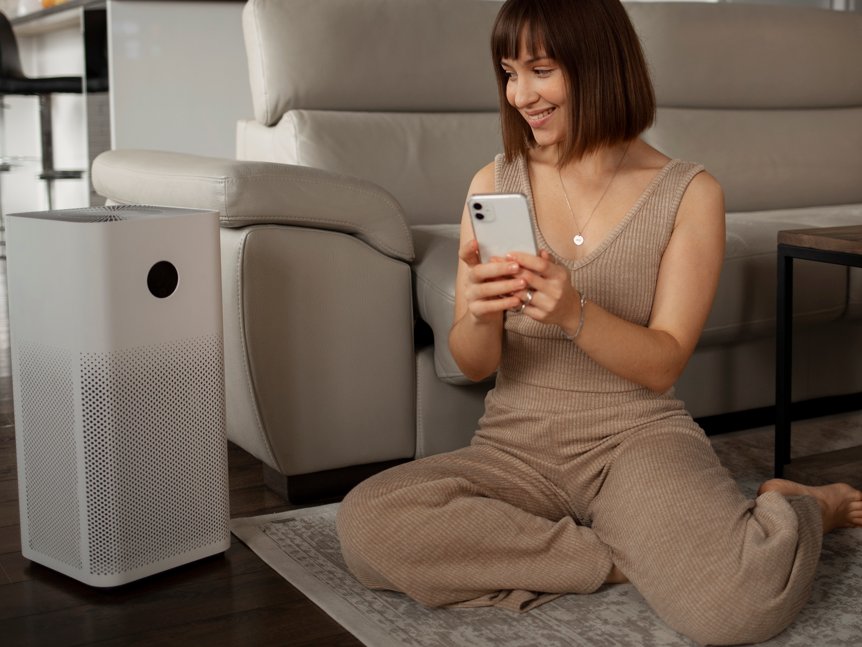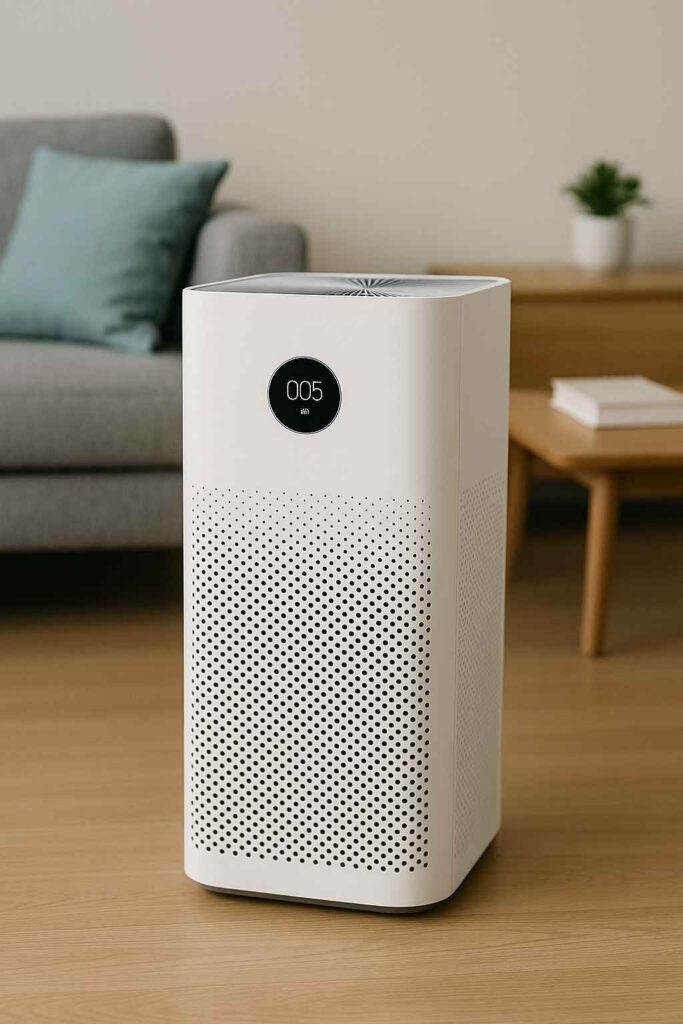
Discover the best air purifiers for Indian homes. Learn how to choose the right air purifier and understand the key benefits, features, and top options.
Introduction
In today’s world, clean air has become a precious commodity, especially in countries like India, where many cities suffer from severe air pollution. Whether it’s dust, smoke, pollen, or harmful microscopic particles, the air we breathe indoors can often be more polluted than outside. This is where air purifiers play a vital role in safeguarding our health by filtering out harmful pollutants and allergens from the air inside our homes.
This guide will walk you through why air purifiers are essential, how they work, the different types available, and tips for choosing the right one. If you want to improve indoor air quality and protect your family’s respiratory health, this blog is for you.
Related blog: Best kitchen chimneys in India.
Why Do You Need an Air Purifier?
Indoor air pollution can be surprisingly high. Studies show indoor air can be 2 to 5 times more polluted than outdoor air. Many common sources contribute to indoor pollution:
- Dust and dust mites
- Pet dander
- Smoke from cooking or cigarettes
- Volatile Organic Compounds (VOCs) released from paints, furniture, and cleaning products
- Bacteria, viruses, and mold spores
- Allergens like pollen
For people suffering from allergies, asthma, or other respiratory conditions, inhaling these pollutants can worsen symptoms and cause frequent discomfort. An air purifier helps by trapping or neutralizing these particles, making the indoor environment healthier and more breathable.
In northern India, winter smog leads to dangerously high PM2.5 particle levels, and spending more time indoors during this period makes air purifiers a necessary tool for protection.
How Do Air Purifiers Work?
Air purifiers use a variety of technologies to clean the air:
- Mechanical Filters: The most common are HEPA (High-Efficiency Particulate Air) filters that trap particles as small as 0.3 microns with an efficiency of 99.97%. They capture dust, pollen, pet dander, and even some bacteria.
- Activated Carbon Filters: These absorb odors, smoke, and harmful gases like formaldehyde and benzene.
- UV Light Purifiers: Ultraviolet light can destroy bacteria and viruses by disrupting their DNA, making UV air purifiers effective for sterilizing air.
- Ionizers: These devices emit negative ions that attach to airborne particles, making them heavy enough to settle down or be trapped by filters.
Some advanced purifiers combine these technologies to offer comprehensive air cleaning.
Types of Air Purifiers
When selecting an air purifier, you’ll encounter several types depending on the filtering technology used:
- HEPA Air Purifiers: Best for particulate pollution like dust, pollen, and mold spores. Ideal for allergy sufferers.
- Activated Carbon Purifiers: Great for removing odors, smoke, and chemical fumes.
- UV-C Light Purifiers: Suitable for homes concerned about airborne pathogens.
- Ionic Purifiers: Can reduce airborne particles, but sometimes produce ozone, which can be harmful in high amounts.
- Hybrid Models: Combine multiple filtration methods for broad-spectrum air cleaning.

Choosing the Right Air Purifier
Here are key factors to consider before purchasing:
- Room Size:
Check the air purifier’s coverage area or CADR (Clean Air Delivery Rate). A purifier designed for small rooms will not be effective in large spaces. - Filter Types and Replacement Costs:
Look for HEPA and activated carbon filters. Also, check how often filters need replacement and their cost. - Noise Level:
If you plan to use it in bedrooms or study areas, choose a model with quiet operation (usually below 50 dB). - Energy Consumption:
Energy-efficient models help save on electricity bills in the long run. - Smart Features:
Modern purifiers may include air quality sensors, auto-adjust modes, remote app control, and voice assistant compatibility.
6. Brand and Warranty:
Pick reliable brands that offer a good warranty and prompt after-sales support.
Benefits of Using Air Purifiers
- Reduces Allergy and Asthma Symptoms: Traps allergens and reduces respiratory irritation.
- Protects Against Smog: Particularly important in high-pollution cities during winters.
- Eliminates Odors: Removes unpleasant smells from cooking, pets, or smoke.
- Improves Sleep Quality: Cleaner air helps in better breathing and restful sleep.
- Kills Airborne Germs: UV and ionizer-based purifiers can reduce bacteria and viruses in the air.
Maintaining Your Air Purifier
To keep your purifier working efficiently:
- Clean or vacuum pre-filters every few weeks.
- Replace HEPA and carbon filters as recommended by the manufacturer.
- Keep the unit away from walls and curtains to ensure proper air flow.
- Operate it in closed rooms for better air purification.
- Use stabilizers if voltage fluctuations are common in your area.
Common Mistakes to Avoid
- Buying based only on price: A cheap purifier might not have the right filtration or coverage.
- Ignoring room size: A small purifier won’t clean large rooms effectively.
- Not replacing filters on time: Dirty filters reduce efficiency and may emit pollutants back into the air.
- Placing a purifier near open windows: Polluted outdoor air will enter continuously, reducing effectiveness.
Frequently Asked Questions
Q: Can air purifiers remove viruses like COVID-19?
A: HEPA filters can trap some viruses, but air purifiers should be used alongside other safety measures like ventilation, masks, and hygiene.
Q: How long should I run the purifier daily?
A: For best results, run it continuously or during high pollution periods. Many models have energy-saving modes.
Q: Are air purifiers safe for children and pets?
A: Yes, most are safe and help reduce pet dander and allergens.
Q: Can air purifiers eliminate cigarette smoke?
A: Purifiers with activated carbon filters can significantly reduce smoke particles and odors.
Conclusion
An air purifier is no longer a luxury but a necessity in today’s polluted environment. It can dramatically improve indoor air quality, reduce allergy and asthma symptoms, and protect your family from harmful pollutants. By understanding your needs, room size, and features, you can choose the perfect purifier to breathe cleaner, healthier air every day.

Pingback: Home Appliances – Ultimate Guide for Every Modern Indian Home - Home Appliances
Pingback: Best Vacuum Cleaners for Home & Office Use in 2025 - Home Appliances